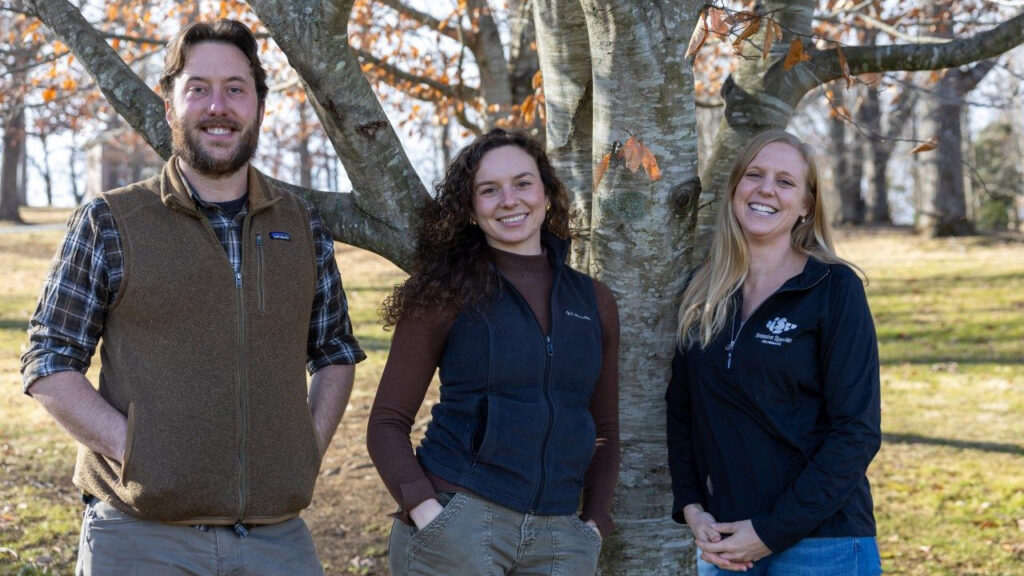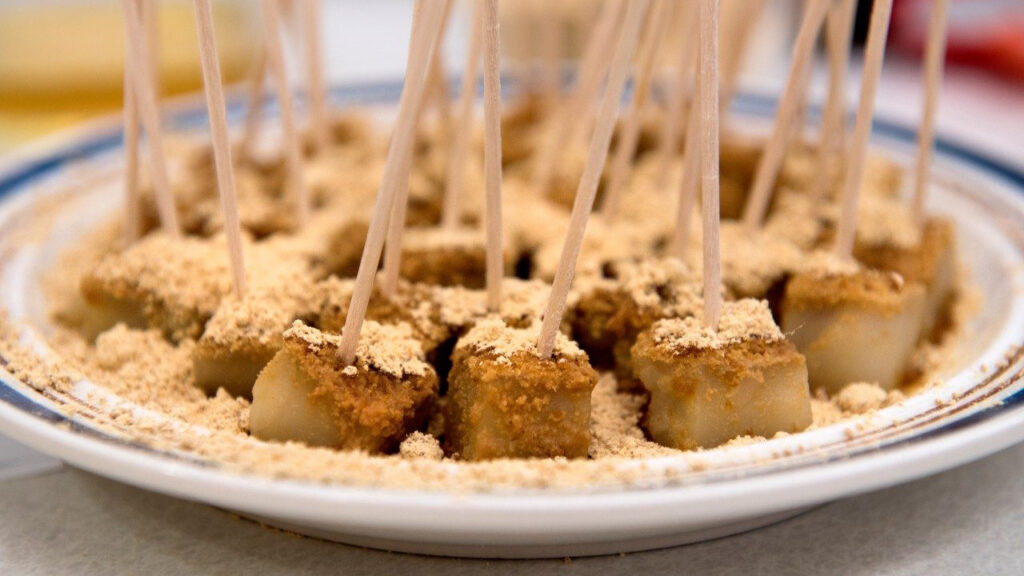VT News
Articles and videos from VT News that highlight invasive species research, education, & engagement

Hot off the press

January 22, 2026
An alum returns as an industry partner, collaborating with her former professor on a research project to examine treatments for beech leaf disease and oak wilt, two serious threats to forest health.

December 2, 2025
A new study found that species introductions, more than extinctions, are reshaping how seeds move across 120 islands worldwide.

November 12, 2025
Invasive species often thrive because they have no natural predators — yet surprisingly, some of them are not only edible to humans, but downright delicious, with flavors that could enhance a Thanksgiving table spread.
Media archive
2025
- Introduced species are changing how seeds move on islands
- Pass the Thanksgiving kudzu: Expert on edible invasive species
- Graduate students uncover stories hidden in the forests of the past
- ‘Curious Conversations’ podcast: Lindsay Miles talks about bed bugs’ history
- Managing ponds may help save native salamanders
- Researcher targets invasive tree of heaven and the pest that depends on it
- Appalachia’s Edible Landscape
- Virginia Tech researcher awarded Great Lakes Fishery Commission grant for sea lamprey project
- Invasive pest devastating popular landscaping shrub arrives in Virginia
- Using the spotted lanternfly to control a different kind of invasive species
- Man’s best friend could be the spotted lanternfly’s worst enemy
- A surprising ally in the fight against spotted lanternfly
- Invasive Species Collaborative welcomes four new faculty
- Bed bugs are most likely the first human pest, research shows
- University of Concepción and Virginia Tech strengthen scientific alliance to address biodiversity loss
- Mitigating invasive species through transdisciplinary science
- Researchers find first evidence of potential bed bug insecticide resistance in gene mutation
- Newman Library exhibit explores dangers of invasive species
- Virginia Tech ecologist appointed to prestigious National Invasive Species Advisory Committee
- Virginia Tech invasive species experts available to speak on the environment, human health, biosecurity, policy, and economics
- Community power is key to controlling invasive species
- Hybrid fire ants turn up the heat in Southwest Virginia
- New exhibit unravels the impacts of invasive species
- A new forest health champion at Virginia Tech
2024
- Organic collaboration propagates National Science Foundation grant
- ‘Curious Conversations’ podcast: Carrie Fearer talks about forest health and natural disasters
- Doctoral student tackles barley yellow dwarf virus threatening wheat crops
- Expert explains effects of catastrophic weather events on forests and tree species
- Researchers receive grant to study invasive autumn olive
- Researchers receive USDA funding to combat devilishly invasive tree-of-heaven
- Community embedded ecologist helps bridge gap between researchers and locals
- Researcher receives grant to study and restore tropical rainforest ecology
- Researchers launch Bangladesh’s first biocontrol program to combat invasive weed
- Researcher’s journey turns to forests’ understory
- Restoration Ecology Working Group provides guidance for Town of Blacksburg
- The blue catfish: Wanted breaded or fried
- Destination Area 2.0 grants awarded to five new transdisciplinary projects
- Tracking how seeds travel in the Southern Appalachians
- Future Faculty Diversity Program participants receive Presidential Postdoctoral Fellowships
- Research finds that Guam treesnakes are biting off more than they can chew
- Genome study informs restoration of American chestnut tree
- Tracking invasive plant species in the Chesapeake Bay watershed
- Invasive ants spread by hitchhiking
- Invasive species presented to the Board of Visitor’s Committee
- How to counter Japanese beetles, the nemesis of turfgrass
- Virginia Tech researchers help answer an urgent call for native seeds in Southside Virginia
- Championing collaboration in the invasive species space
- Callery pear trees are blooming again, and that’s bad news
- Get ready to stomp: Spotted lanternflies are about to reappear
- Invasive species sound off about impending ecosystem changes
- Joro spiders are nothing to worry about
- Help stop the invasive spotted lanternfly
2023
- Invasive species removal is a team effort
- Expanded perspectives give greater voice to invasive species working group
- Researching how detection dogs can combat invasive species and plant disease
- New Destination Area 2.0 grants fund four interdisciplinary projects
- Two transdisciplinary research teams earn Destination Area 2.0 Phase II awards
- Bringing the case for ecological restoration home
- No frogs or toads left behind on Virginia Tech researchers’ watch
- Toxic hammerhead worms
- Experience an acoustic invasion at ICAT Day
2022
- PhD student researches method that could stop invasive tree
- Student addressing the impact of invasive species in Nepal scores major BIFAD award
- Intersecting science and art collaboration highlights invasive species research
- Faculty & staff honored with annual College of Agriculture and Life Sciences awards
- A snapshot of native wildlife research
2021 and earlier
- Virginia Tech team tracks invasive weeds & climate change impacts from space
- Virginia Tech expert available to discuss lower barriers to invasive species
- Virginia Tech & University of Virginia work to safeguard U.S. tomato industry from invasive pest
- When invasive plants take root, native animals pay the price
- New expert findings seek to protect national parks from invasive animal species
- Researchers embarks on kayaking trip to assess invasive crayfish species
- New expert findings seek to protect national parks from invasive species
- Virginia Tech researchers tackle the biological invasions crisis
- Invasive plants have surprising ability to pioneer new continents and climates
- Alumnus discovers invasive insect on campus & launches efforts to protect trees
- Researchers help to design incentive programs to rid South America of invasive beaver
- US national parks face crisis over invasive animal species
- Virginia Tech plant ecologist receives grant to study invasive agricultural weed
- Virginia Tech researchers itching to learn more about poison ivy on the Appalachian Trail
- Virginia Tech works to protect Africa’s crops against invasive pests
- Students say bon appétit to invasive species
- Vacuum-steam treatment for invasive snails proves promising
- Successful ecological restoration must meet more robust standards
- Virginia Tech wildlife ecologist links severe declines in Everglades mammals with invasive pythons
Video highlight
Gabrielle Ripa, a Ph.D. student at Virginia Tech and an affiliate of the Invasive Species Collaborative, is studying invasive non-native plant species in restored and unrestored streams in Maryland’s Chesapeake Bay watershed. Ripa is placing bioacoustic recorders at various locations, and the data will be used to analyze the effect invasive plants have on the soundscape of an ecosystem.
